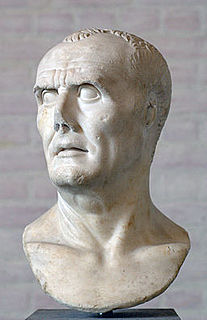Related Research Articles

The 2nd century BC started the first day of 200 BC and ended the last day of 101 BC. It is considered part of the Classical era, although depending on the region being studied, other terms may be more suitable. It also considered to be the end of the Axial Age. In the context of the Eastern Mediterranean, it is referred to as the Hellenistic period.

The 3rd century BC started the first day of 300 BC and ended the last day of 201 BC. It is considered part of the Classical era, epoch, or historical period.
Year 202 BC was a year of the pre-Julian Roman calendar. At the time it was known as the Year of the Consulship of Geminus and Nero. The denomination 202 BC for this year has been used since the early medieval period, when the Anno Domini calendar era became the prevalent method in Europe for naming years.
Year 129 BC was a year of the pre-Julian Roman calendar. At the time it was known as the Year of the Consulship of Tuditanus and Aquillius and the Sixth Year of Yuanguang. The denomination 129 BC for this year has been used since the early medieval period, when the Anno Domini calendar era became the prevalent method in Europe for naming years.
This article concerns the period 129 BC – 120 BC.
This article concerns the period 149 BC – 140 BC.
This article concerns the period 159 BC – 150 BC.
Year 46 BC was the last year of the pre-Julian Roman calendar. At the time, it was known as the Year of the Consulship of Caesar and Lepidus. The denomination 46 BC for this year has been used since the early medieval period, when the Anno Domini calendar era became the prevalent method in Europe for naming years.
This article concerns the period 189 BC – 180 BC.
This article concerns the period 199 BC – 190 BC.
Year 150 BC was a year of the pre-Julian Roman calendar. At the time it was known as the Year of the Consulship of Flamininus and Balbus. The denomination 150 BC for this year has been used since the early medieval period, when the Anno Domini calendar era became the prevalent method in Europe for naming years.
Year 151 BC was a year of the pre-Julian Roman calendar. At the time it was known as the Year of the Consulship of Lucullus and Albinus. The denomination 151 BC for this year has been used since the early medieval period, when the Anno Domini calendar era became the prevalent method in Europe for naming years.
Year 191 BC was a year of the pre-Julian Roman calendar. At the time it was known as the Year of the Consulship of Nasica and Glabrio. The denomination 191 BC for this year has been used since the early medieval period, when the Anno Domini calendar era became the prevalent method in Europe for naming years.
Year 190 BC was a year of the pre-Julian Roman calendar. At the time it was known as the Year of the Consulship of Asiaticus and Laelius. The denomination 190 BC for this year has been used since the early medieval period, when the Anno Domini calendar era became the prevalent method in Europe for naming years.
Year 180 BC was a year of the pre-Julian Roman calendar. At the time it was known as the Year of the Consulship of Luscus and Piso/Flaccus. The denomination 180 BC for this year has been used since the early medieval period, when the Anno Domini calendar era became the prevalent method in Europe for naming years.

Marcus Porcius Cato, also known as Cato the Elder, Cato the Censor, Cato the Wise, and Cato the Ancient, was a Roman soldier, senator and historian known for his conservatism and opposition to Hellenization. He was the first to write history in Latin. His epithet "Elder" distinguishes him from his equally famous great-grandson Cato the Younger, who opposed Julius Caesar.

Lucius Cornelius Scipio Asiaticus, simply known as Scipio Asiaticus, was a general and statesman of the Roman Republic. He was the son of Publius Cornelius Scipio and the younger brother of Publius Cornelius Scipio Africanus. He was elected consul in 190 BC, and later that year led the Roman forces to victory at the Battle of Magnesia.

Lucius Aemilius Paullus Macedonicus was a two-time consul of the Roman Republic and a noted general who conquered Macedon, putting an end to the Antigonid dynasty in the Third Macedonian War.

Aemilia Tertia, also known as Aemilia Paulla, was the wife of the Roman consul and censor Scipio Africanus. She was the daughter, possibly the third surviving daughter, of the consul Lucius Aemilius Paullus and the sister of the consul Lucius Aemilius Paulus Macedonicus.

Publius Cornelius Scipio Africanus, also known as Scipio Africanus Major, Scipio Africanus the Elder, and Scipio the Great, was a Roman general and later consul who is often regarded as one of the greatest military commanders and strategists of all time. His main achievements were during the Second Punic War. He is best known for defeating Hannibal at the final Battle of Zama in 202 BC. The victory was one of the feats that earned him the agnomen Africanus.